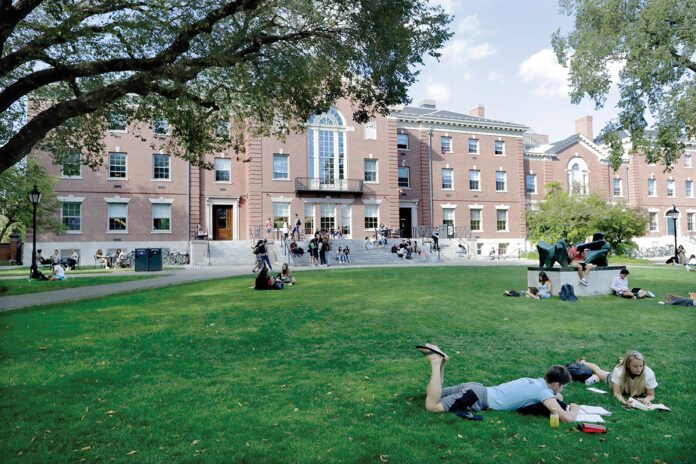
PROVIDENCE – Local colleges and universities for the better part of the last two years conducted test after test, health screening after health screening and required everyone on their respective campuses to don masks in order to contain COVID-19 as much as possible.
As students had their first official semester back in the fall of 2020 after the pandemic shutdown, colleges, despite surrounding communities seeing high case counts, kept the virus off their campuses through their mitigation efforts.
However, that process came with a large bill. Local colleges had to spend millions of dollars since the pandemic began in March 2020 on testing kits, protective wear and even had to shell out lots of money in room-and-board refunds to students during the pandemic’s genesis.
But many local colleges have received some significant financial relief from the federal government for the high COVID-19 testing costs the institutions incurred, with some hoping to get additional relief.
Ten local colleges to date have received $57.3 million in combined COVID-19 testing reimbursements from the U.S. Federal Emergency Management Agency through its Public Assistance program. Nine of them are private institutions, with the University of Rhode Island being the only local state institution receiving FEMA COVID-19 financial reimbursements to date. Eight of the colleges have received at least $1.4 million in federal testing assistance.
FEMA spokesperson Daniel F. Laurich said the typical cost share through the program is 75% FEMA funding, with the balance being covered by either state funding or the applicant. For COVID-19, Laurich said any applicants who applied for relief between January 2020 through July 1, 2022, would receive 100% funding for their requests.
Association of Independent Colleges and Universities of Rhode Island President Daniel P. Egan told Providence Business News that more than 50% of the testing done statewide were performed by the local colleges. He said states, such as Rhode Island, who chose to not use state funds to reimburse colleges, particularly private colleges, for COVID-19 testing and apply them for “other issues” were supported by the FEMA funding.
“The Biden administration deserves a lot of credit for that in delivering for the schools,” Egan said, “and recognizing what [the colleges] did as a public health initiative for the state of Rhode Island.”
Brown University, which was at the forefront of many COVID-19 initiatives – requiring students and employees to be vaccinated, requiring booster shots and de-densifying the campus via a trimester schedule for the 2020-21 academic year, among other protocols – received $33 million in FEMA reimbursements, by far the most of all the local colleges. University spokesperson Brian Clark told PBN the Ivy League institution between August 2020 through January 2022 conducted 604,904 COVID-19 tests on 18,229 different people. He also said Brown in January transitioned away from PCR tests in favor of rapid tests when the highly transmissible Omicron variant took hold in late 2021.
Providence College received $5.1 million in FEMA reimbursements for testing, while Roger Williams University in Bristol got $4.4 million. Bryant University in Smithfield ($3.9 million), Johnson & Wales University ($1.6 million) and Salve Regina University in Newport ($1.4 million) also received FEMA reimbursements for COVID-19 testing expenses.
In Massachusetts, Stonehill College in Easton and Wheaton College in Norton received from FEMA $3.4 million and $3.2 million in reimbursements, respectively. Laurich says the University of Massachusetts Dartmouth has submitted an application for testing and FEMA is currently reviewing it.
URI to date received $752,000 from FEMA for COVID-19 expenses, according to university spokesperson Dawn Berganito, of which approximately half was for COVID-19 test kits. The remaining balance, she said, was for personal protective equipment.
Rhode Island College received $54,600 from FEMA, which was 75% of its initial request, spokesperson Jeanne St. Pierre said. RIC spokesperson John Taraborelli also said the college did not seek further assistance from FEMA because RIC did not think a mass COVID-19 outbreak would occur on campus with most the college holding classes remotely through much of the 2020-21 academic year.
Taraborelli did say the college – which has $380,000 in testing costs – did receive COVID-19 related funding through other sources, such as from the federal Coronavirus Aid, Relief, and Economic Security Act, the Coronavirus Response and Relief Supplemental Appropriations Act and the American Rescue Plan Act. He also said the state supported RIC’s pandemic-related expenses, such as emergency student aid, mitigation expenses and lost revenue.
The Community College of Rhode Island had $4.3 million in COVID-19 testing expenses, which were covered by the federal Higher Education Emergency Relief Fund, CCRI spokesperson Amy Kempe said.
Even with the relief, COVID-19-related expenses remain high. Clark said Brown’s total such expenses exceed $80 million for its 2021 and 2022 fiscal years. To help mitigate those expenses, Brown, Clark said, implemented short-term measures, such as a hiring freeze, freezes on salaries and a “small increase” in the university’s endowment contribution to its operating budget.
“We were able to meet the full financial need for all aided undergraduates even with the financial impact of the pandemic, and avoided layoffs of any regular employees,” Clark said.
Colleges can also apply more than once to FEMA for testing assistance, according to FEMA spokesperson Dennis Pinkham. Egan said Brown applied about four to five times to FEMA to get reimbursements. Berganito said URI is still seeking additional federal assistance for testing expenses, which to date are $5.7 million.
Pinkham said the FEMA application window will remain open as long as COVID-19 remains a declared federal emergency. If and when that emergency ceases, the application window will only be about 30 days after the emergency ends, he said.
But, applicants who applied for funding for any COVID-19 testing after July 1, 2022, will receive a 90% cost share, Laurich said. Plus, he said colleges who wish to submit reimbursement applications for any testing work done before July 1, 2022, have until Dec. 31 to do so.
CCRI, Bristol Community College and New England Institute of Technology have yet to submit applications, Laurich said.
James Bessette is the PBN special projects editor, and also covers the nonprofit and education sectors. You may reach him at Bessette@PBN.com. You may also follow him on Twitter at @James_Bessette.












